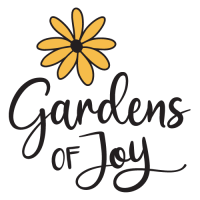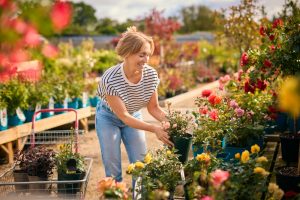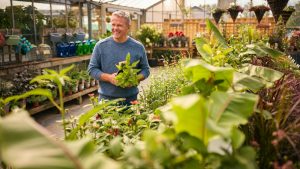A Guide to the Best Gardening Tips From Blue Diamond Garden Centre
If you’re looking for the best gardening tips and advice, then the Blue Diamond Garden Centre is the place to be. With their team of experienced gardeners and horticulturalists, the Blue Diamond Garden Centre offers a wide range of gardening tips and advice to help you create a beautiful and healthy garden. Whether you’re a beginner or a seasoned green thumb, these gardening tips can help you get the most out of your garden. From planting and watering tips to pruning and fertilizing advice, the experts at Blue Diamond Garden Centre have all the answers you need to create a thriving garden. With their years of experience, the staff at Blue Diamond Garden Centre can help guide you through the process of creating and maintaining a beautiful garden. So, check out their top tips and get growing today!
Planting and Watering Tips
When it comes to planting, there are a few things you’ll want to keep in mind. First, make sure your plants are the right size for your space and that they won’t grow too tall and overshadow neighbouring plants. If you’ve got a sunny area, you may want to choose plants that thrive in full sun. If you’ve got a shadier spot, consider plants that prefer partial or full shade. For most areas, spring and fall are the best times to plant new annuals, perennials, shrubs, and trees. When it comes to watering, it is important to water your garden deeply. However, make sure to avoid over-watering your plants. Next, be sure to water your garden at the right time. To find out when you should be watering your garden, check out our watering guide.
Pruning and Fertilizing Advice
When it comes to pruning, you’ll want to prune your garden during the growing season. For annuals, perennials, shrubs, and trees, prune them when they’ve finished flowering. For vegetables, prune them as needed or when they’ve finished harvesting. Next, when it comes to fertilizing your garden, you’ll want to do it in the spring and fall. For vegetables and annuals, you’ll want to use a fertilizer with more nitrogen. For perennials, shrubs, and trees, use a fertilizer with more phosphorus and potassium. For more information on how to fertilize your garden, check out our fertilizing guide.
Choosing the Right Soil and Mulch
When it comes to choosing the right soil for your garden, you’ll want to consider the colour, texture, drainage, as well as the plants that will be growing in it. For example, if you’re growing tomatoes, you’ll want to choose a soil that’s light and sandy. However, if you’re growing carrots, you’ll want a soil that’s heavier and loamy. Next, when it comes to choosing the right mulch for your garden, you’ll want to consider the plants that will be growing in your garden. For example, if you’re growing tomatoes, you’ll want to choose a straw mulch. However, if you’re growing carrots, you’ll want to choose a black plastic mulch. For more information on soil and mulch, check out our soil and mulch guide.
Choosing the Right Plants
When it comes to choosing the right plants, you’ll want to consider the amount of sunlight, soil type, and the amount of water each plant needs. For example, if you’re growing tomatoes, you’ll want to choose a plant that thrives in full sun. However, if you’re growing strawberries, you’ll want to choose a plant that prefers partial shade. Another important factor to consider when choosing plants is the amount of maintenance each plant requires. For example, if you’re growing flowers, you’ll want to choose a plant that requires little maintenance. However, if you’re growing herbs, you’ll want to choose a plant that requires more maintenance. For more information on picking the right plants, check out our plant guide. Blue diamond garden centre
Tips for Dealing with Pests and Diseases
When it comes to dealing with pests and diseases in your garden, prevention is key. Make sure to rotate your plants to avoid pests and diseases. This means that you should not grow the same plants in the same place year after year. Also, make sure to remove diseased plants and weeds as soon as you notice them. Next, you can use organic pesticides and sprays to control pests and diseases in your garden. However, make sure to use these products as directed and only as a last resort. Another way to prevent pests and diseases in your garden is by practicing good gardening practices such as proper weeding and watering. Additionally, you can start a garden compost to keep your soil healthy and full of nutrients. For more information on pests and diseases, check out our pest and disease guide.
Tips for Creating a Healthy Garden
When it comes to creating a healthy garden, there are a few things you’ll want to keep in mind. First, make sure you’re rotating your crops so that you’re not growing the same plants in the same place year after year. This helps prevent pests and diseases. Next, make sure to fertilize your garden to keep it healthy and full of nutrients. Finally, make sure to water your garden deeply, but infrequently. For more information on creating a healthy garden, check out our healthy garden guide.
Benefits of Composting
Composting is an easy and effective way to get your garden off to a healthy start. Composting helps to make your soil rich and full of nutrients; thus, enabling your plants to grow better. Composting can be done in a few different ways. You can compost in a bin, a tumbler, or a pile. When composting, you’ll want to keep a few things in mind. First, make sure your compost is moist, but not wet. Next, make sure to add nitrogen, carbon, and grit to your compost as needed. Finally, make sure to turn your compost regularly to keep it balanced and healthy. For more information on composting, check out our composting guide.
Tips for Growing Indoor Plants
When it comes to growing indoor plants, it is important to keep a few things in mind. First, you’ll want to choose plants that are best suited for indoor growing, such as orchids and spider plants. Next, make sure to water your plants regularly and fertilize them as needed to keep them healthy. Finally, make sure to repot your plants as needed to give them room to grow. For more information on growing indoor plants, check out our indoor plant guide.
Conclusion
Growing a garden is a rewarding experience. Not only is it an excellent way to get some fresh air and exercise, but it’s also a great way to save money, eat healthier, and learn more about where your food comes from. With the right tips and advice, you can ensure that your garden thrives and that you get the most out of it. From planting and watering tips to pruning and fertilizing advice, there are plenty of tips and tricks you can use to create a thriving garden.
This article is provided by https://www.gardencentreguide.co.uk/blue-diamond-group





